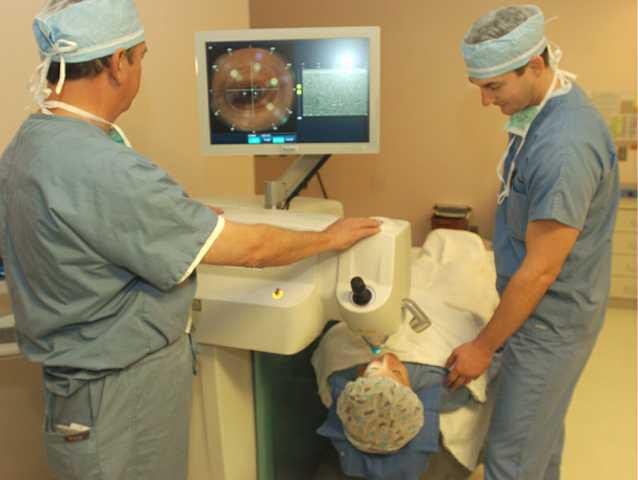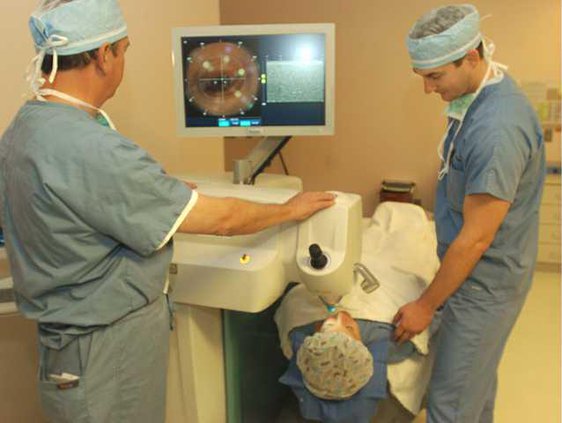Four area residents are now cataract-free after surgery Tuesday.
The type of surgery isn't new, but the method of removal is. They are the first four people in Georgia to have had their cataracts removed via bladeless surgery.
Drs. Clayton Blehm and Jack Chapman Jr., ophthalmologists at Gainesville Eye Associates, recently became certified to perform the procedure using the LenSx laser.
LenSx is the only laser cataract machine that's FDA-approved, Blehm said. Some others are in the works, but it could be anywhere from six months to two years before there's competition.
"We wanted to offer the safest, most accurate, greatest outcome cataract surgery that we possibly could to our patients," Blehm said. "We felt this was a step that would give us unparalleled excellence for our patients."
Chapman said when it comes to cataracts it's easy to think of the eye as a camera. There's the lens and the retina, the "film" of the eye.
"As we go along in life, the lens becomes cloudy. It starts becoming hazy and blocks the image getting back to the retina," he said.
In previous surgeries, the incisions to remove cataracts were made manually with a blade. While it was one of the safest surgeries in the medical industry, it left lots of room for human error. Not so with the new laser technology.
The lens capsule, almost a lens cap for the eye, must be removed first during cataract surgery before the lens and cataracts can be. This is done through the process of capsulorhexis. Studies have shown that less than 10 percent of these incisions have been able to maintain the same accuracy as a laser's, according to information provided by Tracy Whitmire, director of practice development for Accusite — the company that owns the LenSx machine.
After the lens capsule is removed, the lens must be split into removable pieces and then vacuumed out.
In traditional surgery, this requires ultrasonic energy to be done effectively, but because the laser softens the lens, less energy is required. This increases the safety of the procedure and reduces strain on the eye, Whitmire said.
There are three lenses that can be implanted after surgery: one that allows glasses to be worn, one for astigmatism patients and a multifocal lens, where glasses are not worn for the majority of the day, Whitmire said.
"This is a major milestone in cataract surgery," Chapman said.
Chapman said Gainesville Eye Associates was the first Georgia business to show interest in the new machine, so it was almost sheer luck to get it. The practice is the 44th center in the U.S., and only the 87th in the world, to be able to perform the procedure.
Chapman said between he and Blehm, there are 2,500 to 3,000 cataract surgeries performed annually.
After talking to their patients, 60 to 70 percent of them showed more interest in the laser surgery than the traditional one, Blehm said.
He said there are several benefits to using bladeless cataract surgery for most people.
In addition to minimal pain and a quicker recovery time than traditional surgery, the incisions can be customized to patients' eyes. It can also help correct astigmatism, a condition in which the eye becomes more football shaped and affects how the eye sees images.
The LenSx machine is staying in the Gainesville practice right now, but the intent is for it to become mobile, Whitmire said.
Right now, it's not covered by private insurance companies, so there is a patient expense for the procedure, Blehm said. He said those with corneal scars or growths are not good candidates for the procedure, as the laser would be unable to get into the eye.
Whitmire said the laser incisions, aside from all the other differences, are what doctors are most excited about.
"The best surgeon in the world can replicate the perfect incision maybe 10 percent of the time," she said. "It's impossible to be that precise all the time, and with these guys doing maybe 30 surgeries a day, to have that level of precision is just amazing."

